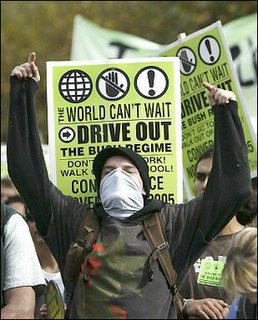Not one hand went up.
This is after four years of the word appearing on the front pages of the nation's newspapers, on network and cable news, and online. This is after years of highly publicized lawsuits, Congressional inquiries, and international controversy and condemnation. This is after the release of a Hollywood film of that title, starring Jake Gyllenhaal, Meryl Streep, and Reese Witherspoon.
I was dumbstruck. Finally one hand went up, and the student sheepishly asked if rendition had anything to do with a version of a movie or a play.
I nodded charitably, then attempted to define the word in its more public context. I described specific accounts of U.S. abductions of foreign citizens, of the likely treatment accorded such prisoners when placed in the hands of countries like Syria and Egypt, of the months and years of detention. I spoke of the lack of formal charges, of some prisoners' eventual release and how their subsequent lawsuits against the U.S. government were stymied in the name of national security and secrecy.
The students were visibly disturbed. They expressed astonishment, then revulsion. They asked how such practices could go on.
I told them to look around the room at one another's faces; they were seated next to the answer. I suggested that they were, in part, the reason that rendition, waterboarding, Guantánamo detention, warrantless searches and intercepts, and a host of other such practices have not been more roundly discredited. I admit it was harsh.
That instance was no aberration. In recent years I have administered a dumbed-down quiz on current events and history early in each semester to get a sense of what my students know and don't know. Initially I worried that its simplicity would insult them, but my fears were unfounded. The results have been, well, horrifying.
Nearly half of a recent class could not name a single country that bordered Israel. In an introductory journalism class, 11 of 18 students could not name what country Kabul was in, although we have been at war there for half a decade. Last fall only one in 21 students could name the U.S. secretary of defense. Given a list of four countries — China, Cuba, India, and Japan — not one of those same 21 students could identify India and Japan as democracies. Their grasp of history was little better. The question of when the Civil War was fought invited an array of responses — half a dozen were off by a decade or more. Some students thought that Islam was the principal religion of South America, that Roe v. Wade was about slavery, that 50 justices sit on the U.S. Supreme Court, that the atom bomb was dropped on Hiroshima in 1975. You get the picture, and it isn't pretty.
As a journalist, professor, and citizen, I find it profoundly discouraging to encounter such ignorance of critical issues. But it would be both unfair and inaccurate to hold those young people accountable for the moral and legal morass we now find ourselves in as a nation. They are earnest, readily educable, and, when informed, impassioned.
I make it clear to my students that it is not only their right but their duty to arrive at their own conclusions. They are free to defend rendition, waterboarding, or any other aspect of America's post-9/11 armamentarium. But I challenge their right to tune out the world, and I question any system or society that can produce such students and call them educated. I am concerned for the nation when a cohort of students so talented and bright is oblivious to all such matters. If they are failing us, it is because we have failed them.
Still, it is hard to reconcile the students' lack of knowledge with the notion that they are a part of the celebrated information age, creatures of the Internet who arguably have at their disposal more information than all the preceding generations combined. Despite their BlackBerrys, cellphones, and Wi-Fi, they are, in their own way, as isolated as the remote tribes of New Guinea. They disprove the notion that technology fosters engagement, that connectivity and community are synonymous. I despair to think that this is the generation brought up under the banner of "No Child Left Behind." What I see is the specter of an entire generation left behind and left out.
It is not easy to explain how we got into this sad state, or to separate symptoms from causes. Newspaper readership is in steep decline. My students simply do not read newspapers, online or otherwise, and many grew up in households that did not subscribe to a paper. Those who tune in to television "news" are subjected to a barrage of opinions from talking heads like CNN's demagogic Lou Dobbs and MSNBC's Chris Matthews and Fox's Bill O'Reilly and his dizzying "No Spin Zone." In today's journalistic world, opinion trumps fact (the former being cheaper to produce), and rank partisanship and virulent culture wars make the middle ground uninhabitable. Small wonder, then, that my students shrink from it.
Then, too, there is the explosion of citizen journalism. An army of average Joes, equipped with cellphones, laptops, and video cameras, has commandeered our news media. The mantra of "We want to hear from you!" is all the rage, from CNN to NPR; but, although invigorating and democratizing, it has failed to supplant the provision of essential facts, generating more heat than light. Many of my students can report on the latest travails of celebrities or the sexual follies of politicos, and can be forgiven for thinking that such matters dominate the news — they do. Even those students whose home pages open onto news sites have tailored them to parochial interests — sports, entertainment, weather — that are a pale substitute for the scope and sweep of a good front page or the PBS NewsHour With Jim Lehrer (which many students seem ready to pickle in formaldehyde).
Civics is decidedly out of fashion in the high-school classroom, a quaint throwback superseded by courses in technology. As teachers scramble to "teach to the test," civics is increasingly relegated to after-school clubs and geeky graduation prizes. Somehow my students sailed through high-school courses in government and social studies without acquiring the habit of keeping abreast of national and international events. What little they know of such matters they have absorbed through popular culture — song lyrics, parody, and comedy. The Daily Show With Jon Stewart is as close as many dare get to actual news.
Yes, the post-9/11 world is a scary place, and plenty of diversions can absorb young people's attention and energies, as well as distract them from the anxieties of preparing for a career in an increasingly uncertain economy. But that respite comes at a cost.
As a journalist, I have spent my career promoting transparency and accountability. But my experiences in the classroom humble and chasten me. They remind me that challenges to secrecy and opacity are moot if society does not avail itself of information that is readily accessible. Indeed, our very failure to digest the accessible helps to create an environment in which secrecy can run rampant.
It is time to once again make current events an essential part of the curriculum. Families and schools must instill in students the habit of following what is happening in the world. A global economy will have little use for a country whose people are so self-absorbed that they know nothing of their own nation's present or past, much less the world's. There is a fundamental difference between shouldering the rights and responsibilities that come with citizenship — engagement, participation, debate — and merely inhabiting the land.
As a nation, we spend an inordinate amount of time fretting about illegal immigration and painfully little on what it means to be a citizen, beyond the legal status conferred by accident of birth or public processing. We are too busy building a wall around us to notice that we are shutting ourselves in. Intent on exporting democracy — spending blood and billions in pursuit of it abroad — we have shown a decided lack of interest in exercising or promoting democracy at home.
The noted American scholar Robert M. Hutchins said, decades ago: "The object of the educational system, taken as a whole, is not to produce hands for industry or to teach the young how to make a living. It is to produce responsible citizens." He warned that "the death of a democracy is not likely to be an assassination from ambush. It will be a slow extinction from apathy, indifference, and undernourishment." I fear he was right.
I tell the students in my secrecy class that they are required to attend. After all, we count on one another; without student participation, it just doesn't work. The same might be said of democracy. Attendance is mandatory.
Ted Gup is a professor of journalism at Case Western Reserve University and author of Nation of Secrets: The Threat to Democracy and the American Way of Life (Doubleday, 2007).














